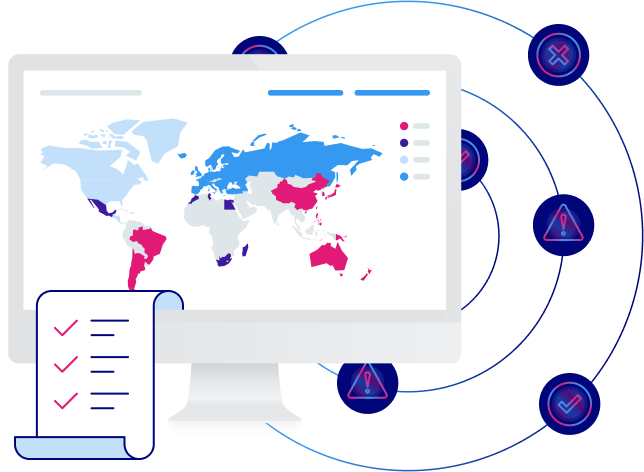-
Solutions
- AI Governance
- Geo-Specific Cookie Banner
- Consumer Preference Management
- Data Subject Request Automation
- Data Mapping and Vendor Risk Management
- Privacy, Vendor, and Risk Assessments
- Privacy Program Management
- Regulatory Guidance
- Privacy Program Consulting
- Certifications and Verifications
- International Data Transfers
Forrester TEI ROI of Privacy ReportTrustArc commissioned a Forrester study to analyze the potential benefits of using our platform and the Forrester team found ROI linked to efficiency, compliance, and decreased cost in data breaches.
Read the report -
Products Products Consent & Consumer Rights Overview
Experience automated privacy solutions that simplify compliance, minimize risk, and enhance customer trust across your digital landscape.
- Cookie Consent Manager Effortlessly manage cookie consent for global compliance, ensuring a secure, personalized browsing experience.
- Consent & Preference Manager Easily manage customer consent across brands and platforms—email, mobile, advertising—with a centralized repository.
- Individual Rights Manager Automate and streamline DSR workflows to ensure compliance and show your commitment to customer rights.
- Trust Center Quickly centralize, manage, and showcase all trust and safety information in an easily customizable, no-code hub.
Products Privacy & Data Governance OverviewSimplify privacy management. Stay ahead of regulations. Ensure data governance with cutting-edge solutions.
- PrivacyCentral Centralize privacy tasks, automate your program, and seamlessly align with laws and regulations.
- Data Inventory Hub & Risk Profile Gain full visibility and control of your data and accurately identify and mitigate risks.
- Assessment Manager Automate and score privacy assessments like PIAs and AI Risk, streamlining your compliance workflow.
- Nymity Research Get instant access to the latest in privacy regulations, legal summaries, and operational templates.
Products Assurance & Certifications OverviewBoost brand trust with TRUSTe's certifications, showing your privacy commitment with the most recognizable seal, assessed by unbiased experts.
- Dispute Resolution
- TRUSTe Enterprise Privacy Certification
- TRUSTe EDAA Privacy Certification
- TRUSTe APEC CBPR and PRP Certification
- TRUSTe Data Collection Certification
- CCPA/CPRA Validation
- Data Privacy Framework Verification
- GDPR Validation
- Digital Advertising Alliance Validation
- TRUSTe Responsible AI Certification
-
Regulations
- EU General Data Protection Regulation (GDPR)
- California Consumer Privacy Act (CCPA)
- Virginia Consumer Data Protection Act (CDPA)
- NIST AI Framework
- ISO/IEC 27001
EU Artificial Intelligence Act (EU AI Act)EU's regulation on the use of AI and the world's first comprehensive AI law.
Learn moreData Privacy Framework (DPF)Transatlantic data transfer mechanism for EU-U.S., UK, and Swiss-U.S. commerce.
Learn more - Resources
- Contact us
Connecticut Data Privacy Act (CTDPA)
The CTDPA, also called “An Act Concerning Personal Data Privacy and Online Monitoring”, gives Connecticut residents more control over their personal data. It requires organizations to take reasonable steps to safeguard the personal data of Connecticut residents from unauthorized access and disclosure.
Are you subject to the Connecticut – CTDPA?
The Connecticut – CTDPA applies to businesses in Connecticut or produce products or services targeted to Connecticut residents, and meets any of the following criteria:
-
Controls or processes personal data of 100,000 or more consumers (except personal data controlled or processed solely for payment transaction completion).
-
Derives over 25% of gross revenue from personal data sales or process personal data of 25,000 or more consumers.
Obligations & rights under the Connecticut – CTDPA
This data privacy and protection law requires organizations to provide control and transparency to Connecticut residents on how their personal data is collected, sold, and disclosed.Consents & opt-outs
Obtain prior consent from consumers for processing sensitive personal data, and prior to selling or offering to sell their consumer health data. Provide a clear and conspicuous opt-out link on your website for consumers or their authorized representative to opt out of targeted advertising or sale of their personal data. Under the CTDPA, universal opt-out mechanisms must be recognized by businesses as valid consumer requests beginning January 1, 2025.
Policies & notices
Provide consumers with reasonably accessible, clear, and meaningful privacy notices that includes (1) categories of personal data processed, (2) the purpose for processing the personal data, (3) instructions for consumers to exercise their rights, including how to appeal a rejected consumer request, (4) categories of personal data shared with third parties and (5) the controller’s email address or other online contact mechanism.
Data subject rights & requests
Consumers have the right to request to know what personal information has been collected, deletion of any personal information collected, opt out of the sale of their personal information, correction of inaccurate personal information, and to limit use and disclosure of sensitive personal information. Businesses must be able to fulfill and address these requests within 45 days.
Vendor management
Under the CTDPA, businesses must have contracts in place with third-party vendors to ensure adherence to the controller’s instructions and assisting them in meeting their obligations.

Connecticut Personal Data Privacy and Online Monitoring Act
While the Connecticut Privacy Law has similarities to other states, understand the key differences to meet compliance from controller and processor responsibilities to detailed consumer rights.
Achieve compliance
-
Complete and maintain a data inventory Automate with TrustArc’s Data Inventory Hub. Save time and reduce risk with automated data flow mapping, risk analysis, and remediation for personal data processes and general activities associated.
-
Mitigate risks Use pre-built DPIAs and vendor assessments to mitigate risks with TrustArc’s Assessment Manager.
-
Exercising individual rights DSAR automation with TrustArc’s Individual Rights Manager – automates workflows under specific jurisdictions including audit trails and customized reports.

The information provided does not, and is not intended to, constitute legal advice. Instead, all information, content, and materials presented are for general informational purposes only.




